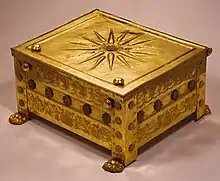larnax
English

a larnax
Etymology
Borrowed from Ancient Greek λάρναξ (lárnax).
Pronunciation
- (Received Pronunciation) IPA(key): /ˈlɑːnæks/
- (General American) IPA(key): /ˈlɑɹnæks/
Noun
larnax (plural larnakes or larnaxes)
- (archaeology, historical) A small closed coffin, box or cinerary urn often used as a container for human remains in Ancient Greece.
- 1973, Studies in Mediterranean Archaeology, volume 37-41, page 24:
- The borders found on the sarcophagus also occur in similar positions on the terracotta larnakes.
- 1992, Rivka Gonen, Burial Patterns and Cultural Diversity in Late Bronze Age Canaan:
- Burial in larnaxes was first practiced in Crete in the Early Minoan period (EM) and its popularity grew in the Middle Minoan period (MM).
- 2005, Yiannis Papadatos, Tholos Tomb Gamma: A Prepalatial Tholos Tomb at Phouni, Archanes:
- Black painted band on the upper surface of the larnax rim, extended below the rim, both inside and outside.
-
This article is issued from Wiktionary. The text is licensed under Creative Commons - Attribution - Sharealike. Additional terms may apply for the media files.